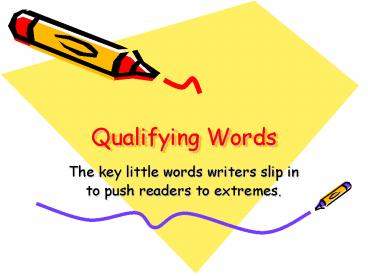Qualifying Words - PowerPoint PPT Presentation
1 / 19
Title:
Qualifying Words
Description:
apt to. most. might. a few. may unlikely. What are the. qualifying words? ... Students are apt to blow them off. They get absolutely the worst scores. ... – PowerPoint PPT presentation
Number of Views:149
Avg rating:3.0/5.0
Title: Qualifying Words
1
Qualifying Words
- The key little words writers slip in
- to push readers to extremes.
2
Extreme modifiers tend to create falsehood.
- Extreme modifiers, such as
- always,
- all,
- never, or
- only
- make it more likely that a statement is biased or
false.
3
Common extreme modifiers
- all
- none
- best
- absolutely
- always
- never
- worst
- nobody
- everybody
- certainly
- invariably
- everyone
- no one
- certainly not
4
Qualifying words tend to make text true.
- usually
- frequently
- often
- sometimes
- some
- seldom
- many
- much
- probably
- a majority
- apt to
- most
- might
- a few
- may unlikely
5
What are the qualifying words?
- You should relax and arrive early when taking a
test. - With true or false questions, the questions are
generally true. - No one should keep a steady pace when taking a
test.
6
The qualifying words
- You should relax and arrive early when taking a
test. - With true or false questions, the questions are
generally true. - No one should keep a steady pace when taking a
test.
7
What are the qualifying words?
- Amount of sleep never affects how you'll do on a
test. - With any extra time, you should review all your
answers. - You should never waste time reading the
directions.
8
The qualifying words
- Amount of sleep never affects how you'll do on a
test. - With any extra time, you should review all your
answers. - You should never waste time reading the
directions.
9
What are the qualifying words?
- 7. There is no substitute for the truth.
- 8. Negative words sometimes affect the truth.
- 9. It is often smart to state a reason why the
question would be false. - 10. You should never pay attention to qualifiers
that will make the question true.
10
The qualifying words
- 7. There is no substitute for the truth.
- 8. Negative words sometimes affect the truth.
- 9. It is often smart to state a reason why the
question would be false. - 10. You should never pay attention to qualifiers
that will make the question true.
11
What are the qualifying words?
- The right answers in multiple choice questions
tend to be - short
- at least a paragraph long
- longer and more descriptive
- When guessing on a multiple choice question with
numbers in the answer - always pick the most extreme
- pick answers in the middle range
- skip it
12
The qualifying words
- The right answers in multiple choice questions
tend to be - short
- at least a paragraph long
- longer and more descriptive
- When guessing on a multiple choice question with
numbers in the answer - always pick the most extreme
- pick answers in the middle range
- skip it
13
What are the qualifying words?
- What is the process of elimination in a multiple
choice question - eliminating the wrong answers
- just guessing
- skipping the entire question
- What section should you do last when taking a
test - the easiest
- the very last part of the test
- the most difficult because you have already
completed the objective questions
14
The qualifying words
- What is the process of elimination in a multiple
choice question - eliminating the wrong answers
- just guessing
- skipping the entire question
- What section should you do last when taking a
test - the easiest
- the very last part of the test
- the most difficult because you have already
completed the objective questions
15
Is it probably true or false?
- Use your knowledge of qualifying words to
identify the statements. - Most students prepared for the exam.
- However, no one passed it.
- The professor usually arrives on time.
- Just today, though, he didnt.
- Some of the students were surprised.
16
It depends on the qualifying word.
- Use your knowledge of qualifying words to
identify the statements. - T. Most students prepared for the exam.
- F. However, no one passed it.
- T. The professor usually arrives on time.
- F. Just today, though, he didnt.
- T. Some of the students were surprised.
17
Is it probably true or false?
- Use your knowledge of qualifying words to
identify the statements. - A few professors give tests rarely.
- However, their exams are not hard.
- They often give them as take homes.
- Students are apt to blow them off.
- They get absolutely the worst scores.
18
It depends on the qualifying word.
- Use your knowledge of qualifying words to
identify the statements. - T. A few professors give tests rarely.
- F. However, their exams are not hard.
- T. They often give them as take homes.
- T. Students are apt to blow them off.
- F. They get absolutely the worst scores.
19
Review of Qualifiers
- Extreme modifiers, such as always, all, never, or
only make it more likely that a statement is
biased or false. - Qualifying words, such as usually,
- frequently, and often tend to make text true.

